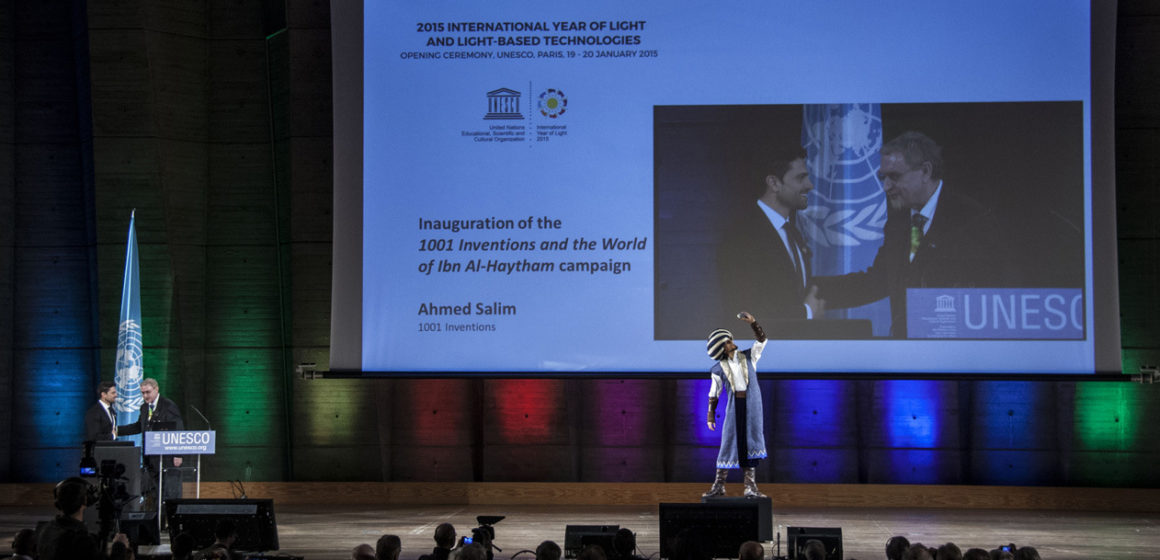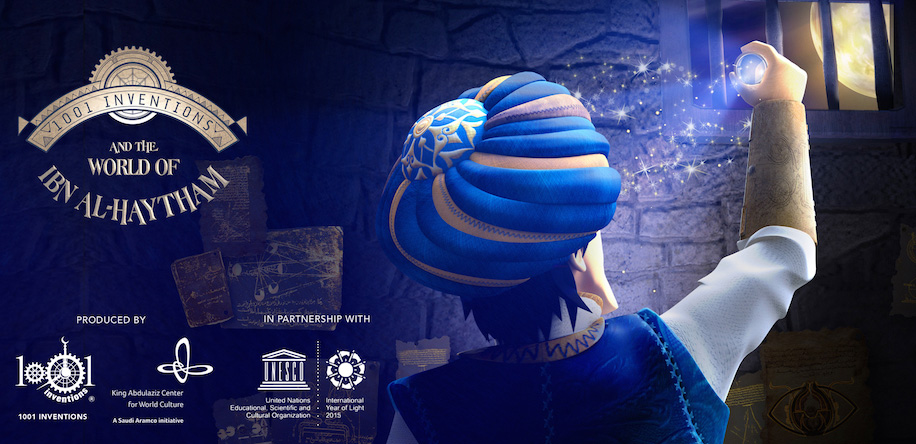THIS EVENT IS COMPLETED
Opening Ceremony
2015 International Year of Light celebrates
11th century scientist Ibn al-Haytham with global campaign
Paris, 19th January 2015: Nobel laureates, international dignitaries, leading scientists and representatives from governments, industry and academia were part of the 2,000 guests at the UNESCO headquarters in Paris that witnessed the launch of a global campaign titled “1001 Inventions and the World of Ibn Al-Haytham” to celebrate the scientific achievements of the renowned 11th century scientist Ibn al-Haytham and his work in optics.
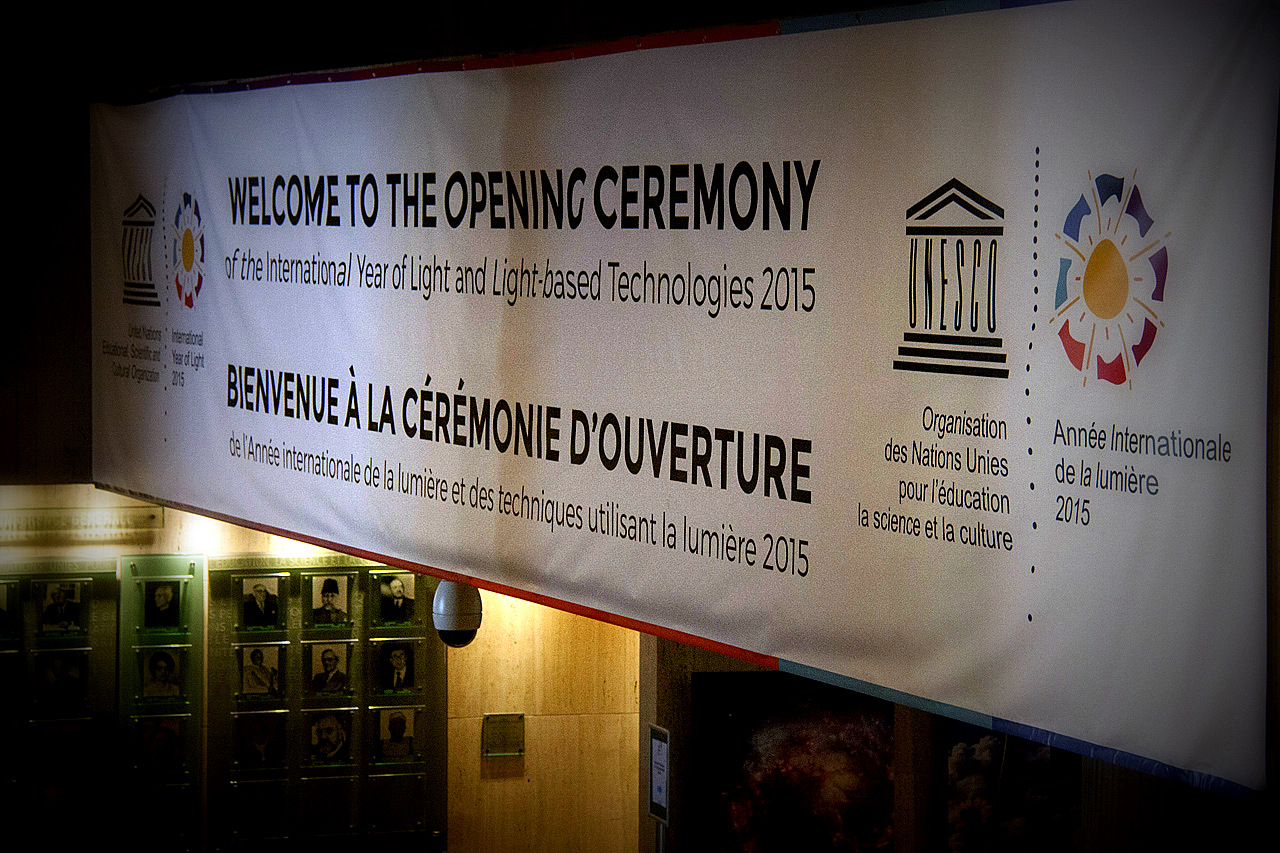
© UNESCO/ Pilar Chiang-Loo
The launch event was part of the high profile opening ceremony of the 2015 International Year of Light and Light-based Technologies (IYL 2015) at the UNESCO headquarters in Paris. IYL 2015 is a yearlong initiative to promote light-science and its applications for humanity initiated by the United Nations and supported by a host of partner organisations from across the world.
The global campaign 1001 Inventions and The World of Ibn Al-Haytham is produced by the UK based, science and cultural heritage organization, 1001 Inventions and Saudi Aramco’s King Abdulaziz Center for World Culture, in partnership with UNESCO and IYL 2015.
UNESCO Director-General Irina Bokova said, “I am pleased to partner with the International Organisation 1001 Inventions to launch the World of Ibn Al-Haytham global campaign, to promote light-science for the benefit of all. A ground-breaking scientist from a thousand years ago, the life and work of Ibn Al-Haytham have never been as relevant as they are today.”
Director-General Irina Bokova announces UNESCO’s partnership with 1001 Inventions to launch a global campaign to celebrate the 10th century scientist Ibn Al-Haytham
www.1001inventions.com/unesco
The global campaign involves a series of high-profile international events, engaging science experiences including interactive exhibits, live shows, workshops, digital content on the website IbnAlhaytham.com, educational products and teaching resources as well as a short feature film staring actor Omar Sharif. The legendary actor came out of retirement specifically to support 1001 Inventions.
The campaign inter-links IYL2015 themes and programmes on science, arts, culture and technology using experiential learning to incite inquisitiveness and curiosity and to encourage young people to study Science, Technology, Engineering and Math (STEM).
Ahmed Salim, Producer and Director of 1001 Inventions, commented: “1001 Inventions is honoured to be a Founding Partner of the International Year of Light 2015 and we’re looking forward to an exciting year ahead. Ibn al-Haytham lived at a very important time in the history of science. A time known as the Golden Age of Muslim Civilisation that spread from Spain in the west to China in the east. Here, men and women of different faiths and cultures built up on knowledge of other civilisations making important positive contributions to humanity. The achievements of Ibn al-Haytham and his peers serve as an inspiration to us today.”
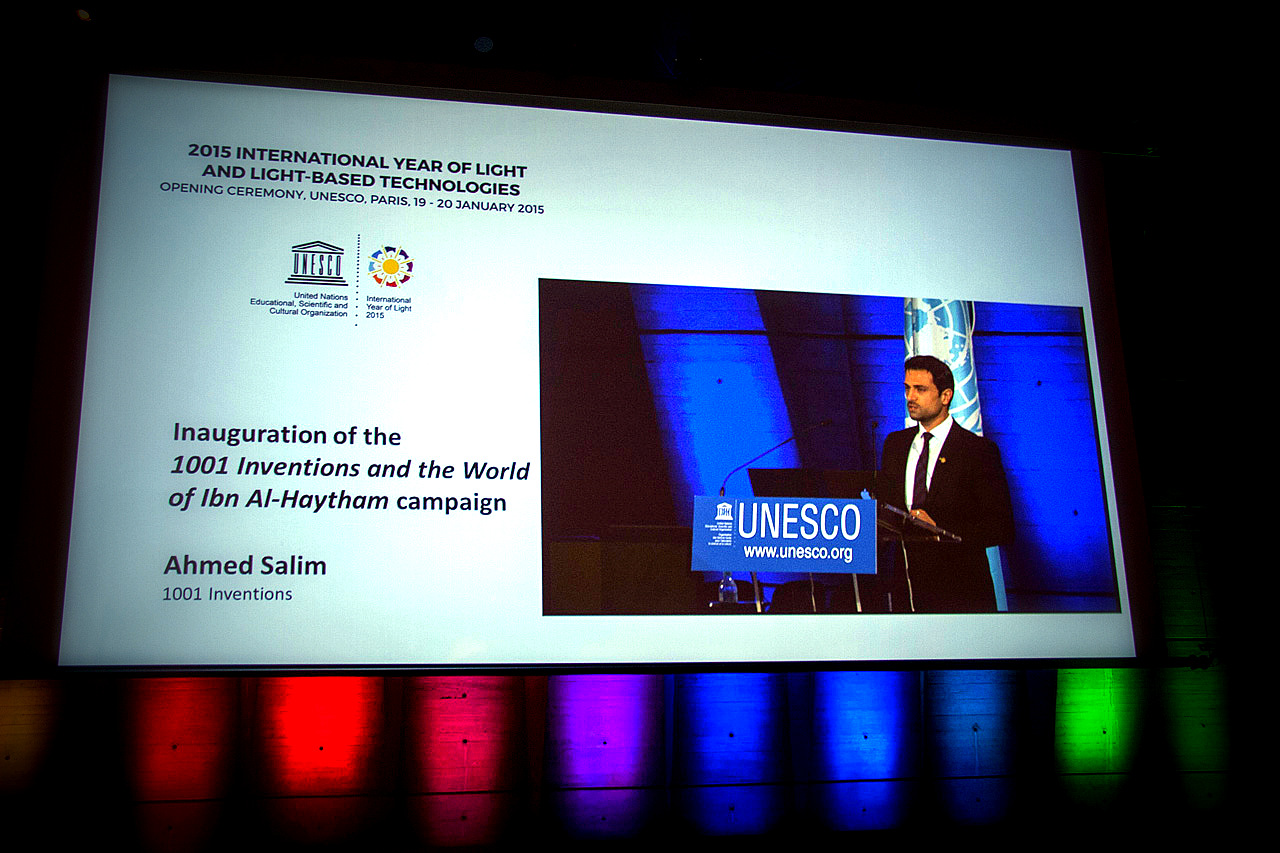
© UNESCO/ Pilar Chiang-Loo
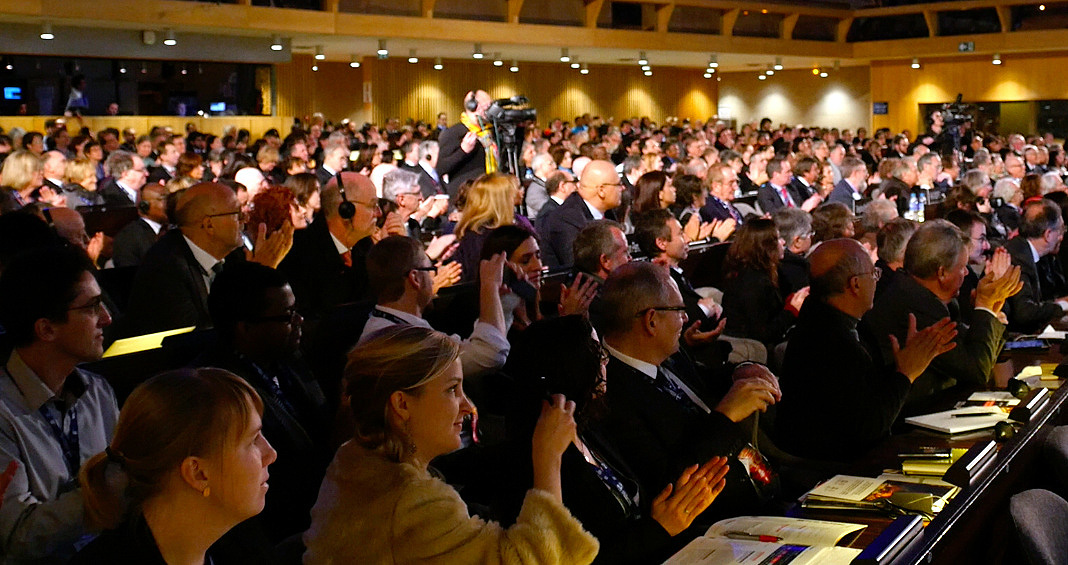
Fuad Al Therman, Director of the King Abdulaziz Center for World Culture in Saudi Arabia, said, “We are delighted to be a partner of this important global initiative that allows us to demonstrate how history and culture can be used to investigate and address the critical issues of our time. With the life and work of Ibn al-Haytham as an inspiration, we are aiming to empower youth with skills and creative thinking methodologies that link the science of the past to contemporary issues to meet 21st century challenges.”
The Chairman of IYL 2015, John Dudley, commented: “Ibn al-Haytham’s achievements in physics, optics, mathematics, astronomy, empiricism and the scientific method have had a lasting, yet underappreciated, impact on the way we live our lives today. His story is one that is integral to the 2015 International Year of Light. I hope it motivates young people to pursue careers in science and strive towards building a brighter future.”
The campaign will now roll out in countries around the world through engaging with museums, science festivals, educational institutions, digital and social media platforms.
~ Click here for Media/Press Coverage ~
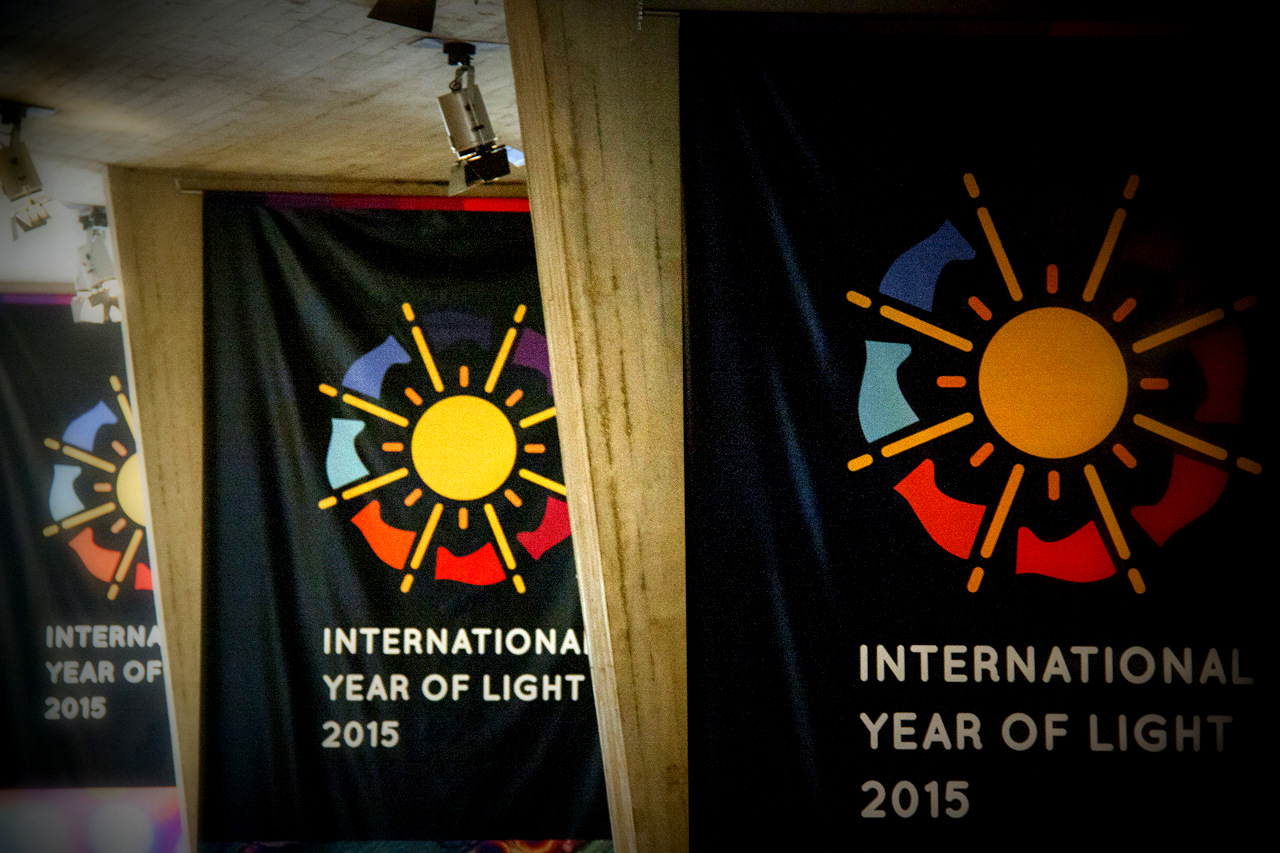
© UNESCO/ Pilar Chiang-Loo
About Ibn Al-Haytham
Ibn al-Haytham was born in the year 965 in Basra (present-day Iraq), and died in about 1040 in Cairo. He was one of the earliest scientists to study the characteristics of light and the mechanism/process of vision. He sought experimental proof of his theories and ideas. During many years of living in Egypt, ten of which were spent under what we may now call protective custody (house arrest), he composed one of his most celebrated works, the Kitab al-Manazir, whose title is commonly translated into English as Book of Optics but more properly has the broader meaning Book of Vision.
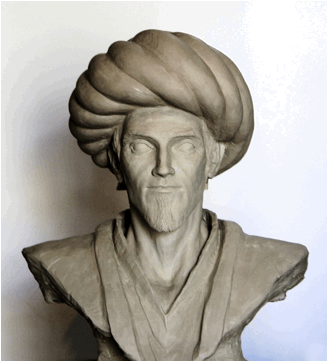
Creative representation bust of Ibn al-Haytham
made by artist Ali Amro and commissioned
by 1001 Inventions for the UNESCO International Year of Light 2015
Al-Hasan Ibn al-Haytham (known in the West by the Latinised form of his first name, initially “Alhacen” and later “Alhazen”) was a pioneering scientific thinker who made important contributions to the understanding of vision, optics and light. His methodology of investigation, in particular using experiment to verify theory, shows certain similarities to what later became known as the modern scientific method. Through his Book of Optics (Kitab al-Manazir) and its Latin translation (De Aspectibus), his ideas influenced European scholars, including those of the European Renaissance. Today, many consider him a pivotal figure in the history of optics and the “Father of modern Optics”.
Ibn al-Haytham was born during a creative period known as the golden age of Muslim civilisation that saw many fascinating advances in science, technology and medicine. In an area that spread from Spain to China, inspirational men and women, of different faiths and cultures, built upon knowledge of ancient civilisations, making discoveries that had a huge and often underappreciated impact on our world.
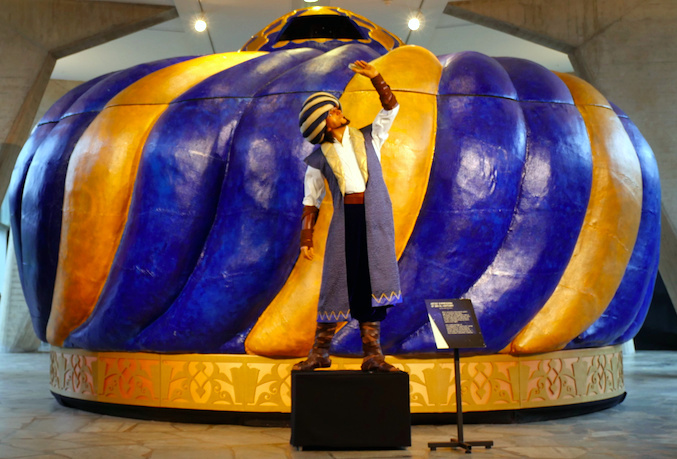
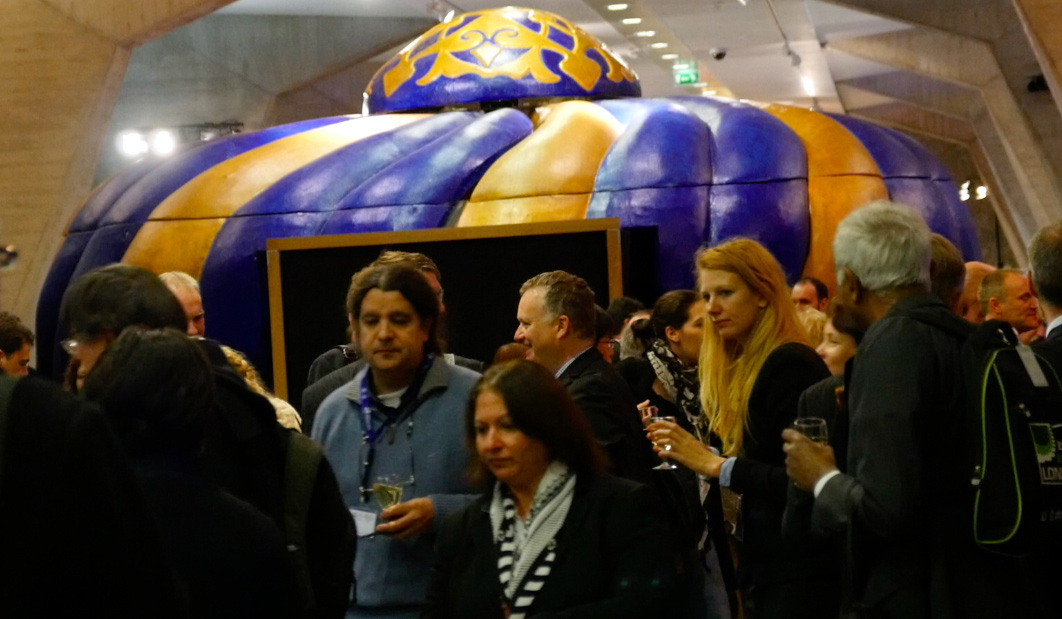
© UNESCO/ Pilar Chiang-Loo
Ibn al-Haytham is credited with explaining the nature of light and vision, through using a dark chamber he called “Albeit Almuzlim” which has the Latin translation as the “camera obscura”; the device that forms the basis of photography.
Out of the 96 books he is recorded to have written; only 55 are known to have survived. Those related to the subject of light included: The Light of the Moon, The Light of the Stars, The Rainbow and the Halo, Spherical Burning Mirrors, Parabolic Burning Mirrors, The Burning Sphere, The Shape of the Eclipse, The Formation of Shadows, Discourse on Light, as well as his masterpiece, Book of Optics. Latin translations of some of his works are known to have influenced many Medieval and European Renaissance thinkers of the Latin West like Roger Bacon, René Descartes and Christian Huygens, who knew him as “Alhazen”. The crater Alhazen on the Moon is named in his honour, as is the asteroid 59239 Alhazen.
Further information can be found at www.IbnAlhaytham.com
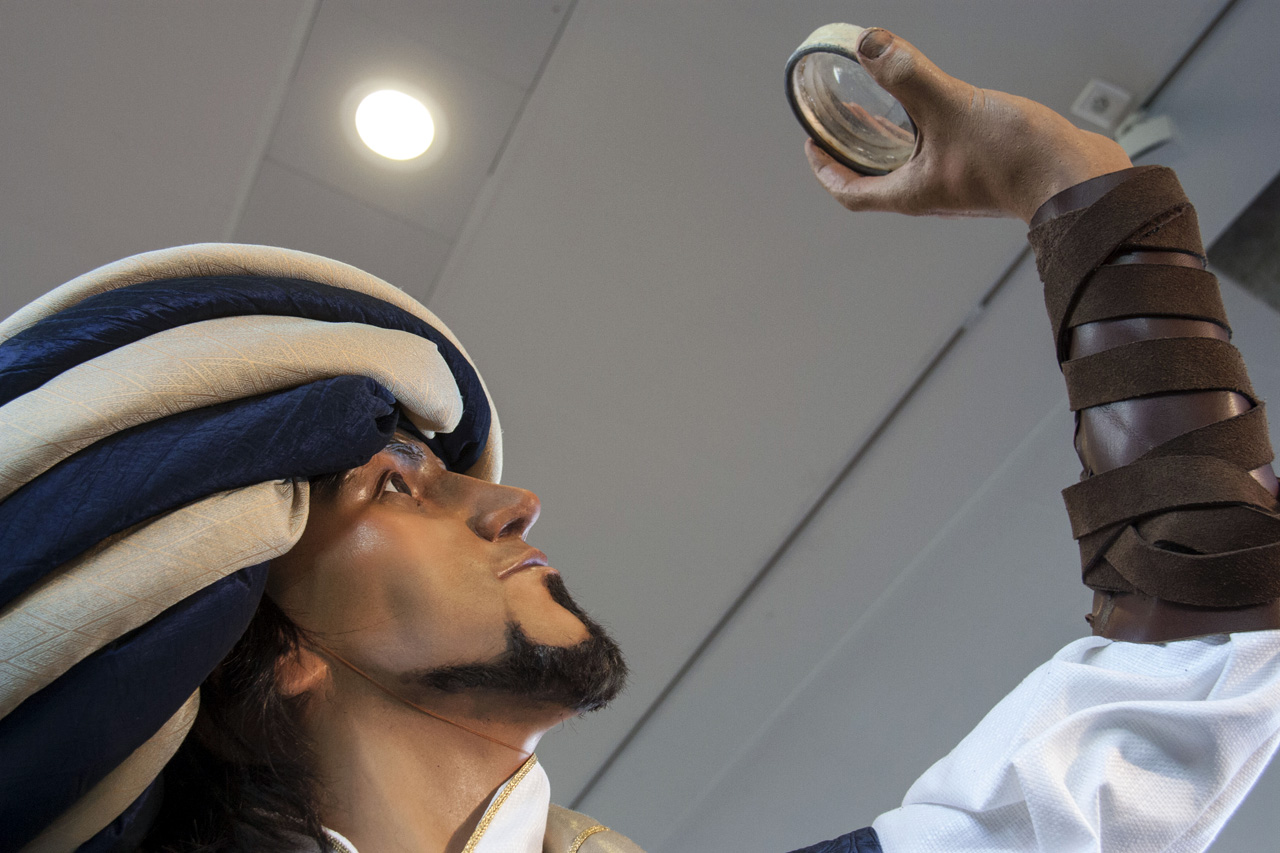
© UNESCO/ Pilar Chiang-Loo
About International Year of Light and Light-based Technologies (IYL 2015)
The International Year of Light and Light-Based Technologies (IYL 2015) is a global initiative adopted by the United Nations (A/RES/68/221) to raise awareness of how optical technologies promote sustainable development and provide solutions to worldwide challenges in energy, education, agriculture, communications and health. With UNESCO as lead agency, IYL 2015 programs will promote improved public and political understanding of the central role of light in the modern world while also celebrating noteworthy anniversaries in 2015—from the first studies of optics 1,000 years ago to discoveries in optical communications that power the Internet today. The IYL Global Secretariat is located at the Abdus Salam International Centre of Theoretical Physics (ICTP).
In addition to 1001 Inventions, the Founding Partners of IYL 2015 are the American Institute of Physics (AIP), the American Physical Society (APS), the Deutsche Physikalische Gesellschaft (DPG), the European Physical Society (EPS), the Abdus Salam International Centre of Theoretical Physics (ICTP), the IEEE Photonics Society (IPS), the Institute of Physics (IOP), the International Society for Optics and Photonics (SPIE), the lightsources.org International Network, Light: Science and Applications, The Optical Society (OSA). Patron Sponsors include Bosca, the International Association of Lighting Designers (IALD), Royal Philips Lighting, Thorlabs and UL.
Further information can be found at:
www.light2015.org

© UNESCO/ Pilar Chiang-Loo
About 1001 Inventions
1001 Inventions is an award-winning, British based organisation that creates international educational campaigns and engaging transmedia productions aiming to raise awareness of the contributions to science, technology and culture from the Golden Age of Muslim Civilisation.
For one thousand years from the 7th century onwards, inspirational men and women, of different faiths and cultures built upon knowledge of ancient civilisations, making discoveries that have had a huge and often underappreciated impact on our world. In an area that spread from Spain to China, this Golden Age of Muslim Civilisation saw fascinating advancements in science and technology that helped pave the way for the European Renaissance.
Over the last decade, 1001 Inventions has engaged with over 200 million people across the globe, with educational campaigns in cities such as in London, Istanbul, New York, Washington DC, Los Angeles, Kuala Lumpur, Abu Dhabi and Jeddah.
1001 Inventions works with a network of international partners and leading academics, and through its academic partner FSTC (UK), to produce world-class experiences, interactive exhibits, feature films, live shows, books and classroom learning materials that are being used by hundreds of thousands of educators around the world.
Further information can be found at www.1001inventions.com
About the King Abdulaziz Center for World Culture
The King Abdulaziz Center for World Culture is a pioneering undertaking by Saudi Aramco, the state-owned oil company of the Kingdom of Saudi Arabia. Created to make a tangible and positive impact on human development by inspiring a passion for knowledge, creativity and cross-cultural engagement, the Center is scheduled to open in 2016 in the Kingdom’s Eastern Province. It will house a library, archives, a lifelong learning center, youth enrichment and innovation programs, a four-gallery museum and a children’s museum. The Center will offer a wide variety of permanent and visiting exhibitions, live events and multimedia venues.
Further information can be found at www.kingabdulazizcenter.com


